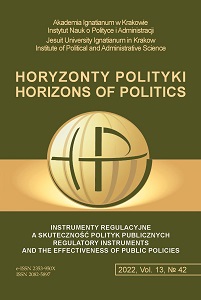Instytucja nowelizacji konstytucji: zakres, funkcje, interpretacje doktrynalne
The Institution of Constitutional Amendments: The Scope, Functions, Doctrinal Interpretations
Author(s): Rafał CzachorSubject(s): Constitutional Law, International Law, Politics and law, Sociology of Law
Published by: Uniwersytet Ignatianum w Krakowie
Keywords: constitutional law; constitutionalism; constitutional amendments; doctrine of ‘unconstitutional constitutional amendments’;
Summary/Abstract: RESEARCH OBJECTIVE: The paper argues the need of opening the legal doctrine for non-legal, particularly political interpretations of constitutionalism. Therefore it discusses the problem of constitutional amendments in both normative and practical dimensions and the less known in Poland concept of ‘unconstitutional constitutional amendments’. THE RESEARCH PROBLEM AND METHODS: The paper aims to discuss the possible scope and functions of constitutional amendments as well as their limits determined by the principle of a democratic state of law. The following study gives close scrutiny to the delimitation of material boundaries of constitutional amendments, which is already a field of scholar studies as well as a judicial practice. It employs doctrinal and additionally comparative methods. THE PROCESS OF ARGUMENTATION: The paper starts with a discussion of the relationship between constitutional amendment and constitutional change. Consecutively, it argues that the normative rigidity and skepticism to wards constitutional flexibility may result in opposite outcomes of undermining the stability of the political system. RESEARCH RESULTS: The analysis confirms the importance of the proper delimitation and mutual relation of the constitutional amendment and constitutional change. It advocates for using functional criteria and distinguishing formal, functional, and symbolic amendments. The proper use of amendment aims to keep a balance between the legal continuity and the new political challenges. To understand constitutional development in a particular country it is necessary to comprehensively study its historical, legal and social contexts. CONCLUSIONS, INNOVATIONS, AND RECOMMENDATIONS: It was argued that the issue of constitutional amenability can be guided by the functionalist approach. Unresolved remain doubts regarding the unamendable constitutional norms. Are such limitations democratic, is the ultimate position of the constitutional courts in determining amendments’ legality in line with democracy or rather creates juristocracy? Definitely, constitutionalism is such a multifaceted phenomenon that there is a strong need for a pluralistic methodological approach.
Journal: Horyzonty Polityki
- Issue Year: 13/2022
- Issue No: 42
- Page Range: 11-29
- Page Count: 19
- Language: Polish

